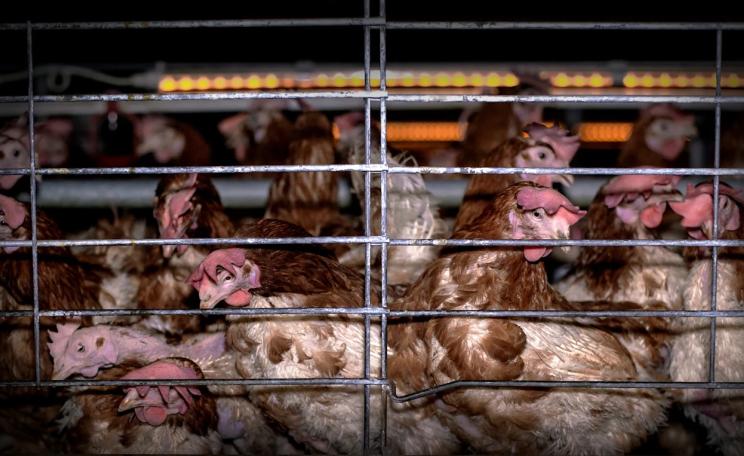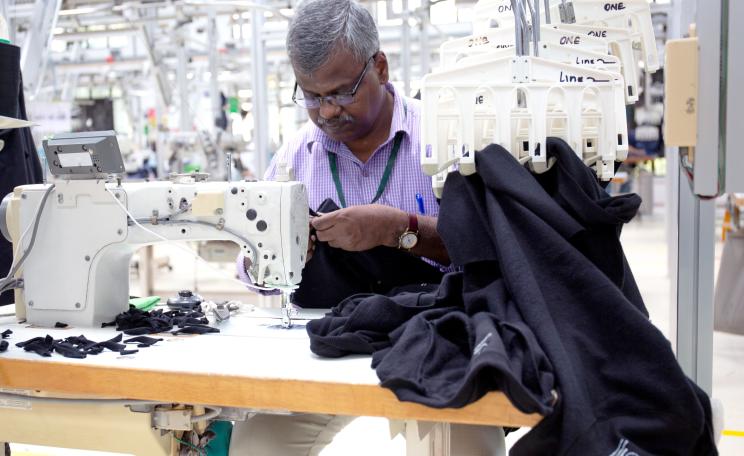Enough pigs are found in acute distress, expressing fear and pain, to clearly indicate that this is not an isolated or infrequent issue.
Pressure group Animal Justice Project (AJP) has released footage from an undercover operation at pig abattoir, C&K Meats, supplying pork products to major supermarkets - an abattoir backed by RSPCA Assured.
The newly released footage shows visible injuries, lameness, wounds, abnormal growths and other deformities; unclean pens and poor hygiene practices; severe stress indicators, such as frothing at the mouth and heavy panting.
The AJP investigator recorded a worker at C&K Meats stating: "Nothing we do for these pigs is for their benefit. From the moment they arrive, everything is geared towards their death."
Breaches
A second worker at C&K Meats was recorded laughing: “They do wind you up at times: anyone would think they didn't want to die.”
Barrister Ayesha Smart, who is also a crown court judge, reviewed the footage and described it as showing "multiple and clear breaches" of statutory animal welfare regulations.
Smart concluded that the findings indicate “recurrent breaches directly related to physical abuse, undue distress and neglect of the pigs' welfare”.
AJP is now urging the shutdown and investigation of the abattoir, a call supported by the law firm Advocates for Animals, which is pressing authorities to take appropriate enforcement action.
Advocates for Animals, upon reviewing the footage, will be contacting Trading Standards, highlighting likely breaches of the Animal Welfare Act 2006.

Plant-based
Claire Palmer, director of AJP, said: “We’re exposing blatant lawbreaking in a slaughterhouse - yet again.
“Animal suffering continues, largely unseen and unreported, despite the Food Standards Agency touting success and reporting low numbers of breaches in UK abattoirs.
“We are calling on Trading Standards to take decisive action against C&K Meats, demonstrating that animal welfare laws must be upheld.
“We also urge consumers to reconsider their support for the meat industry and explore plant-based alternatives.”
Kill
Dr Alice Brough, an experienced veterinarian, said: “This is typical of a UK abattoir: pigs are not afforded a peaceful exit.
Enough pigs are found in acute distress, expressing fear and pain, to clearly indicate that this is not an isolated or infrequent issue.
“They are handled without care in many instances — some drop dead from the stress of unloading, others arrive with severe welfare issues from the farm of origin — in breach of transport law, and several are dead on arrival.
“Enough pigs are found in acute distress, expressing fear and pain, to clearly indicate that this is not an isolated or infrequent issue.”
The undercover footage taken during 2023 from inside C&K Meats — a facility slaughtering both intensively-reared and free-range pigs — reveals numerous apparent breaches of animal welfare laws.
Th abattoir has the capacity to kill around 1,200 to 1,400 pigs per day in CO2 gas chambers and, according to the Mirror, supplies pork to brands including Jolly Hog sold at Tesco, Co-op, Aldi, Sainsbury's, Waitrose, Morrisons, Asda and Lidl. Some of Tesco’s own-brand pork products are also the meat from pigs slaughtered at this abattoir.

Lame
The animal groups have raised further concerns about the treatment of animals. These include workers striking pigs with paddles, forceful movement to the gas chamber using excessive force and signs of serious stress.
These actions may violate Article 5 of The Welfare of Animals (Transport) (England) Order 2006, and Council Regulation (EC) No 1099/2009, which mandates humane handling and prevention of unnecessary suffering.
Dr Alick Simmons, a former UK Government deputy chief veterinary officer, reviewed the footage and commented: “There were several instances in the footage where the use of the paddle for short periods verged on the excessive. It is an offence to strike or kick animals in a slaughterhouse lairage.”
Dr Simmons also expressed concerns about how the animals were transported, based on the evidence in the undercover footage: “Both the transport of unfit animals and pigs dying in transit strongly suggest that insufficient care was taken when selecting pigs for transport”.
Simmons continued: “During unloading, several lame pigs and pigs otherwise apparently unfit to travel (respiratory distress, large umbilical hernia, etc.) were shown. The welfare of these animals is likely to have been compromised prior to loading, but transportation is likely to have exacerbated any problems.
Lax
“These animals should not have been transported and should have been treated or killed humanely at the point of origin.”
AJP is also revealing a troubling pattern of regulatory failures and illegal practices within Britain's slaughterhouses.
An independent analysis of the government’s own statistics suggests that an average of ten serious legal breaches were reported daily by slaughterhouse operators across all 229 UK abattoirs in 2023. This impacts just 0.08 per cent of animals killed.
The Food Standards Agency claims that over 99.9 per cent of UK abattoirs met animal welfare compliance standards in 2023, whilst non-compliance incidents decreased between 2021/22 and 2022/23. A referral for investigation is the highest enforcement power available to an Official Veterinarian.
In 2023, only 28 non compliance breaches of the Welfare of Animals (England) at the Time of Killing (WATOK) regulations 2015 were referred for investigation out of 3,843, suggesting lax enforcement.

Penalties
However, AJP has now carried out five slaughterhouse investigations over five years and has found what they consider to be multiple breaches, daily.
These cases exemplify a systemic failure by slaughterhouse operators to address animal welfare issues. AJP believes these violations affect a significant portion of the billion plus animals slaughtered annually in the UK.
Further, when breaches are discovered the action taken is not sufficient. ‘Verbal advice’ was the only outcome in in 43 per cent of ‘Level 4’ severity incidents.
This is despite the fact such incidence result in serious and imminent risk to animal welfare or where avoidable pain, distress, or suffering.
The lack of real penalties contradicts the Food Standards Agency's own Manual for Official Controls which mandates that a WATOK Enforcement Notice (WEN) should always be considered for such cases, unless the incident is an unavoidable accident or evidence is lacking.
Right of reply
Andrew Opie, director of food and sustainability at the British Retail Consortium, which represents many of the supermarkets, said: “Our members know how important animal welfare is to their customers and take their responsibilities to animal welfare very seriously with regular audits being carried out to ensure that expected standards are being met.
"This is being investigated and action will be taken if any breaches to the high animal welfare standards our members uphold are confirmed.”
A spokesperson for Waitrose confirmed none of its own brand pork came from C&K Meats, adding: "Our work to improve animal welfare standards extends to the branded products we stock, and we're working urgently with Jolly Hog to understand these allegations further."
A Tesco spokesperson said: “We take animal welfare extremely seriously and expect all our suppliers to adhere to our high welfare standards. Any poor practice has no place in our supply chain and having been made aware of this upsetting footage, we are urgently investigating with our supplier.”
An RSPCA Assured spokesperson said: “Animal welfare is our absolute priority and we always investigate any allegations of poor welfare. As soon as we were made aware of the footage, which was taken more than a year ago, we launched an immediate and urgent investigation.
"We take complaints of poor animal welfare very seriously and would always urge anyone with any concerns to contact us straight away, without delay. This is so that we can immediately investigate, visit the premises and address any welfare issues as a priority.”
C&K Meats has been contacted by The Ecologist but has not at this time provided a comment.
This Author
Brendan Montague is editor of The Ecologist.







